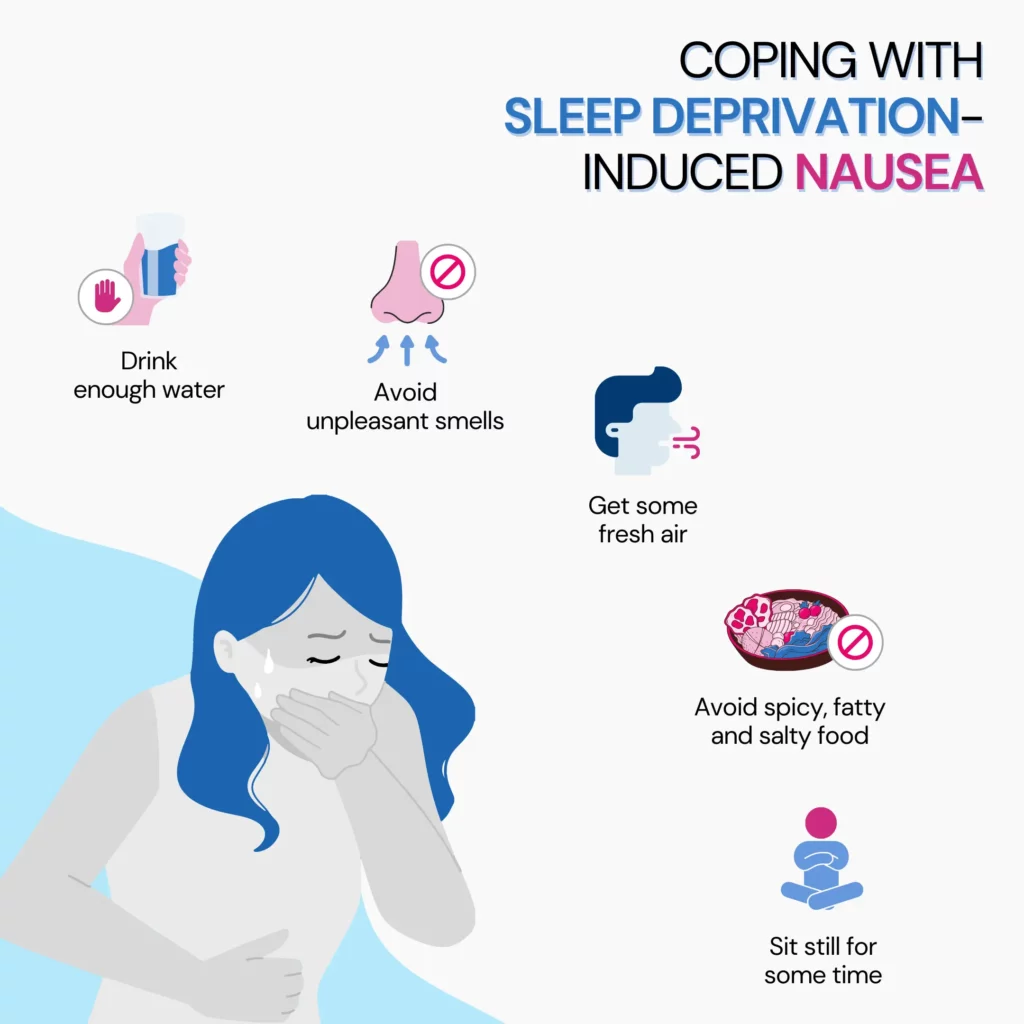Nearly 70 million Americans aren’t getting the sleep they need. Irritability, fatigue, and a foggy mind are the most recognizable symptoms of sleep deprivation, but their effect on our digestive health is equally impactful. A persistent lack of sleep can cause nausea. This fact underscores the importance of quality sleep beyond our mood and emotions for our general well-being. This article will investigate the link between inadequate sleep and the sensation of nausea and practical tips to combat and prevent it. Read on to learn how a good night’s sleep can be crucial for your overall health.
The Link Between Sleep And Gut Health
Getting a good night’s sleep benefits your gut health.
A lack of sleep or insomnia can have severe effects on your gut, including nausea.
Nausea is the feeling of being sick to your stomach and having the urge to vomit.
Here are a few ways in which sleep disorders like insomnia affect your gut health:
- Increased stress: When you don't get enough sleep, your body releases cortisol, the stress hormone. This hormone allows toxins and food waste to enter your bloodstream from your intestine. It can also cause changes in the gut microbiome.
- Poorer dietary choices: To counter the exhaustion and stress from reduced sleep, your body releases a hormone called ghrelin, the craving hormone. This hormone makes you excessively consume fatty, salty, and sugary foods. Too much unhealthy food can negatively impact your gut health.
- Melatonin and GERD: Melatonin is a hormone associated with sleep that regulates the circadian rhythm and affects the digestive system. A lack of this hormone due to a poor night’s sleep can lead to gastroesophageal reflux disease (GERD).
Top Causes Of Sleep Deprivation
Sleep deprivation is when a person has trouble falling or staying asleep.
While it is usually temporary, having trouble sleeping could become a long-lasting chronic problem.
Some common causes of poor sleep are:
- Excessive screen time just before bed
- Drinking too much coffee or alcohol throughout the day
- Uncomfortable sleep environment
- Obstructive sleep apnea (inability to breathe)
- Restless leg syndrome
- Underlying health conditions (arthritis, back pain, anxiety, etc.)
Genes And Sleep Health
Some people feel refreshed with just 6 hours of sleep, while others feel drowsy even after sleeping for 9 hours. While you may be all about the morning jog, your friend’s day might not even start till noon! Like hair or eye color, sleep traits may also be associated with genetics. Understanding the genetic basis of sleep helps highlight certain factors that could affect the quality and quantity of sleep. Using your ancestry test DNA data, you can unlock more than 15+ important aspects of health. Learn more.
Can Lack Of Sleep Cause Nausea?
Nausea can result from stress, current health conditions, or medications you currently take.
Recent studies have found a connection between sleep deprivation and nausea.
Lack of sleep directly affects the digestive system and the body’s immune response, leading to hormonal imbalances.
All these factors collectively make you feel nauseous.
Why Does Lack Of Sleep Cause Nausea?
When you are sleep-deprived, your body’s immune system starts to work overtime, releasing proteins called cytokines.
Cytokines cause tissue inflammation all over the body, including your digestive organs, leading to nausea.
Another effect of sleep deprivation is a changed appetite.
You start to crave oily foods or caffeinated drinks to counter the exhaustion from a poor night’s sleep.
These foods can inhibit digestive enzyme production, deplete beneficial gut bacteria, and inflame your stomach lining further.
These gastrointestinal issues can make you feel nauseous.
Why Do Insomnia And Nausea Occur Together?
Lack of sleep causes problems with regular hormone release.
When you are short on sleep, you feel exhausted and stressed.
Stress stimulates the hypothalamus in your brain to release a corticotropin-stimulating hormone (CRF).
Too much CRF in the body can cause gastrointestinal issues.
It can cause spasms in the upper stomach muscles, making you nauseous.
Thus, nausea tends to occur with insomnia.
At What Point Is Lack of Sleep Considered Sleep Deprivation?
The constraints of sleep deprivation are subjective.
Most definitions of sleep deprivation vary:
- Any amount of sleep that is less than what you need to feel rested is considered sleep deprivation.
- Some people label 24 hours of no sleep as sleep deprivation.
- Others say that not having a good night’s sleep equals sleep deprivation.
- Eight or nine hours of disturbed or poor-quality sleep can also be termed sleep deprivation.
- Four hours of sleep over several nights is termed partial sleep deprivation. Over time, this can also have the same effect as total sleep deprivation.
Hand-picked Article For You: Sleep Issues - Why Do I Keep Waking Up At 4 AM?
What Are The Other Effects Of Lack Of Sleep?
Long-term or chronic lack of sleep can cause problems with your overall health.
Some of these include:
- Poor sleep quality increases blood sugar levels and insulin resistance, which could eventually lead to diabetes.
- Lack of sleep can affect your heart and circulatory system. If you are chronically sleep-deprived, you are more likely to suffer from high blood pressure and high cholesterol, which in turn can affect your heart health.
- You are more likely to develop type 2 diabetes when you are sleep-deprived for a long time.
- Your body can have a lowered immune response to bacterial infection when you are sleep-deprived.
- Lack of sleep can affect cognitive abilities. When you sleep poorly, you feel depressed and anxious and may have difficulty remaining focused and remembering things.
How To Cope With Nausea From Sleep Deprivation
Here are a few simple ways to deal with lack of sleep-induced nausea:
- Drink enough water to keep yourself hydrated.
- Avoid intense and unpleasant smells, as they can worsen your nausea.
- Get some fresh air outside or in an airy room.
- Avoid spicy, fatty, and salty food. Choose bland foods like plain rice, potatoes, or noodles when nauseous.
- Try sitting quietly, as moving around can make your anxiety worse.

How To Remedy A Lack of Sleep
Better sleep hygiene can improve sleep quality and help counter sleep deprivation.
Here are some steps to get more quality sleep:
- Establish a consistent sleep and wake-up routine and follow it religiously, even on the weekends.
- Incorporating bedtime routines like reading a book, brushing your teeth, or dimming the lights. It signals to your body that it’s time to go to bed.
- Avoid caffeine, alcohol, and large meals before going to bed. They can hamper your sleep quality and quantity.
- Exercise and get some sunlight throughout the day. Some studies show that exercising helps improve sleep quality.
- Keep the bedroom cozy and temperature-controlled. A dark, quiet room will help you fall asleep more easily.
- Avoid screens just before going to bed. Blue light can strain your eyes and hamper sleep.
People Are Reading The Top 3 Methods To Fall Asleep Faster
Summary: Can Lack Of Sleep Cause Nausea?
- Lack of sleep can cause nausea.
- Sleep is essential for the body’s overall health.
- When you are short on sleep, you start to have problems with your digestive system and immunity, leading to exhaustion and stress.
- All these factors collectively make you nauseous when you have not slept well.
- You can counter the lack of sleep-induced nausea by avoiding junk foods, drinking fragrant tea, or going to an airy space or room.
- You can also take steps to overcome sleep disorders, such as avoiding screens just before bed, not eating a large meal before bed, and cutting down on caffeine and alcohol.
Frequently Asked Questions
What’s The Longest You Can Go Without Sleep?
Although no clear limit has been discovered yet, the longest a human has stayed awake continuously is around 264 hours, roughly 11 days. Most people start experiencing adverse symptoms within just two or three days without sleep.
Is Sleep Deprivation Fatal?
In a sleep deprivation study performed on animals, a significant accumulation of harmful molecules in their gut eventually proved fatal.
Since we know that sleep deprivation tends to affect the gut in humans as well, this could explain the link between sleep disorders and several diseases that result from it.
Can Sprite Help With Nausea?
Due to its sugary nature, Sprite is better received by people with nausea.
It can sometimes help settle a nauseous stomach, but its sugar content can affect your gut bacteria.
It’s better to consume less sugary drinks like coconut water, chamomile tea, or cooking broths.
References
https://www.sleepfoundation.org/physical-health/can-lack-of-sleep-cause-nausea
https://www.health.com/sleep-deprivation-8364530
https://www.ncbi.nlm.nih.gov/pmc/articles/PMC5385214
https://www.nhlbi.nih.gov/health/sleep-deprivation
https://www.sleepfoundation.org/physical-health/lack-of-sleep-and-diabetes
https://pubmed.ncbi.nlm.nih.gov/18564298
https://www.healthline.com/nutrition/what-happens-if-you-eat-too-much-salt
https://www.ncbi.nlm.nih.gov/pmc/articles/PMC8950745
https://www.healthline.com/health/healthy-sleep/how-long-can-you-go-without-sleep
https://brain.harvard.edu/hbi_news/why-severe-sleep-deprivation-can-be-lethal/
https://www.medicalnewstoday.com/articles/is-sprite-good-for-stomach-flu




